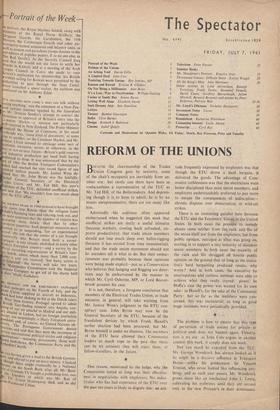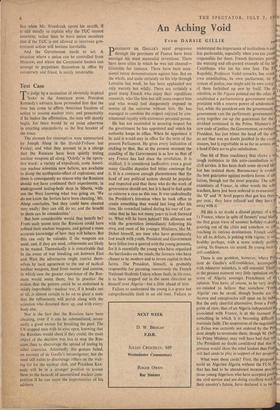REFORM OF THE UNIONS
D EcAusE the chairmanship of the Trades Union Congress goes by seniority, some of the chair's occupants are inevitably from an- other era: but rarely can there have been so coelacanthine a representative of the TUC as Mr. Ted Hill, of the Boilermakers. And depress- ing though it is to have to admit, he is by no means unrepresentative; there are too many like him.
Admittedly 'his audience often appeared embarrassed when he suggested this week that unofficial strikes are really, a useful stimulus (because workers, coming back refreshed, im- prove productivity); that trade union members should not lose much 'sleep over ballot-rigging (because it has existed from time immemorial); and that the trade union movement should not let outsiders tell it what to do. But their embar- rassment was probably because these opinions were being made explicit—just as a Conservative who believes that hanging and flogging are deter- rents may be embarrassed by the manner in which Mr. Cyril Osborne, MP, or Lord Beaver- brook presents his case.
It is not, therefore, a foregone conclusion that members of the Electrical Trades Union, or trade unionists in general, will take warning from Mr. Justice Winn's judgment in the ETU con- spiracy case. John Byrne may now be the General Secretary of the ETU, because of the fraudulent devices by which Frank Haxell's earlier election had been procured; but Mr. Byrne himself is under no illusions. The members of the ETU have allowed their Communist leaders so much rope in the past that there can be no certainty they will reject them, or fellow-travellers, in the future.
One reason, mentioned by the judge, why the Communists lasted so long was their effective- ness in negotiations with employers. No indus- trialist who has had experience of the ETU over the past ten years is likely to dispute this: an atti- tude frequently expressed by employers was that though the ETU drove a hard bargain, it delivered the goods. The advantage of Com- munist ruthlessness was that the electricians were better disciplined than most union members; and employers understandably preferred to pay more to escape the consequences of indiscipline— chronic disputes over demarcation, or wild-cat strikes.
There is an interesting parallel here between the ETU and the Teamsters' Union in the United States. In both cases the pressure to remedy abuses came neither from the, rank and file of the union .itself nor from the employers, but from public opinion, outraged at what was going on, moving in to support a tiny minority of dissident union members. In both cases the 'majority of the rank and file shrugged off hostile public opinion on the ground that so long as the execu- tive's hard bargaining produced results, why worry? And in both cases, the executive by unscrupulous and ruthless methods were 'able to achieve what they really craved: power.' In Hoffa's case the power was wanted for its own sate: in Haxell's, for the sake of the Communist Party: but' so far as the MeMbers were con- cerned, this was immaterial, so long as good wage increases were periodically provided.
The problem is how to .ensure that this type of perversion of trade unions for private or political ends does. not happen again. Exhorta- tion is no use: as John Cole argues in another context this week, it simply does not work.
Nor can much be expected from the TUC". Mr. George Woodcock has always looked as if he might be a decisive influence at Transport Houe--unlike his predecessor Sir Vincent Tewson, who never looked like influencing any- thing; and as each year passes. Mr. Woodcock grows more like an intellectual John L. Lewis, cultivating his eyebrows until they are second only to the new Primate's in their dominance. But when Mr. Woodcock opens his mouth, it is still usually to explain why the TUC cannot intervene, rather than to warn union members that if the TUC is not allowed to intervene gov- ernment action will become inevitable.
And the Government needs to act. A situation where a union can be controlled from Moscow, and where the Communist leaders can arrange to perpetuate themselves in office by conspiracy and fraud, is surely intolerable.



























































 Previous page
Previous page